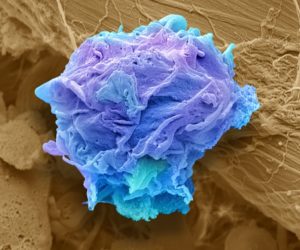Chimeric antigen receptor (CAR) T-cell therapy has been shown to successfully treat refractory B-cell lymphomas. Two new studies published in The New England Journal of Medicine confirm that CAR T-cell therapy can be used to treat B-cell lymphoma patients who have not responded to standard therapies. Neelapu et al. led a phase 2 trial (ZUMA-1) of 111 B-cell lymphoma patients at 22 medical institutions. CAR T-cells were successfully engineered for 110 patients (99%). Of the 101 patients (91%) who received injections of CAR T-cells, 54% had a complete response rate. Similarly, Schuster et al. observed a complete response rate of 57% among 28 refractory B-cell lymphoma patients. Many patients experienced minor adverse events, such as myelosuppression and other neurological problems; however, severe cytokine-release syndrome occurred in 13-18% of the patients and 4 patients died (3 in the ZUMA-1 study). CAR T-cells are a promising new personalized therapy for B-cell lymphoma patients who have little choice after conventional therapies have failed.
References:
- Neelapu SS, Locke FL, Barlett NL, et al. Axicabtagene ciloleucel CAR T-cell therapy in refractory B-cell lymphoma. New England Journal of Medicine 2017;377:2531-44.
- Schuster SJ, Svoboda J, Chong EA, et al. Chimeric antigen receptor T-cells in refractory B-cell lymphomas. New England Journal of Medicine 2017;377:2545-54.
- Tran E, Longo DL, and Urba WJ. A milestone for CAR T cells. New England Journal of Medicine 2017;377: 2593-96.

